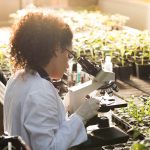Member countries of the Global Research Alliance on Agricultural Greenhouse Gases are supporting various fellowships and awards schemes to help scientists develop new and innovative solutions to address agricultural greenhouse gas emissions.
Building capacity and sharing knowledge and research experiences between countries and organisations is an important way of strengthening international links and increasing cooperation and collaboration. Several GRA member countries have made available various fellowships and award schemes to international participants as a contribution to this effort. This page provides summary information on these schemes and links to find out more. If you would like us to list a new fellowship or award opportunity, please Contact Us.



